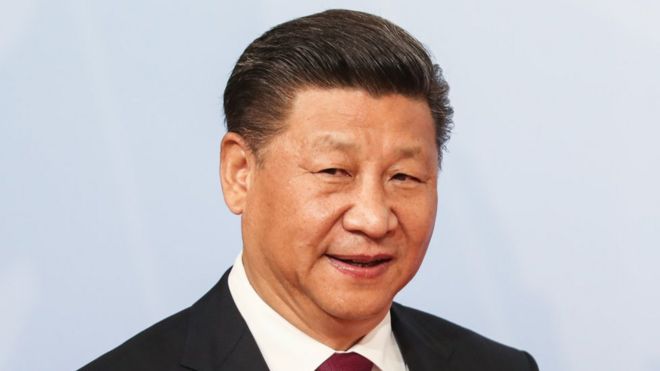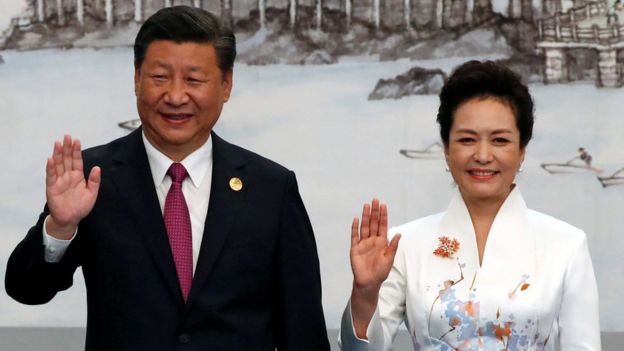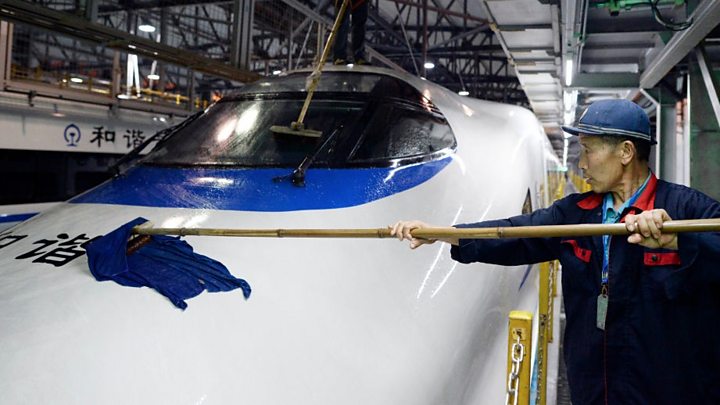Profile: China's President Xi Jinping
 GETTY IMAGES
GETTY IMAGES
Xi Jinping became president of China in 2012 - ushering in an era of increased assertiveness and authoritarianism.
He has been front and centre of China's push to cement its position as a global superpower, while also launching crackdowns on corruption and freedom of speech.
A consummate political chess player who has cultivated an enigmatic strongman image, the leader of the ruling Chinese Communist Party is widely expected to stay at the helm until at least 2022.
Princeling, peasant, president
Born in Beijing in 1953, Xi Jinping is the son of revolutionary veteran Xi Zhongxun, one of the Communist Party's founding fathers and a vice-premier.
Because of his illustrious roots, Mr Xi is seen as a "princeling" - a child of elite senior officials who has risen up the ranks.
But his family's fortunes took a drastic turn when his father was purged in 1962 prior to the Cultural Revolution and imprisoned.
At the age of 15, the younger Xi was sent to the countryside for "re-education" and hard labour in the remote and poor village of Liangjiahe for seven years - an experience that would later figure largely in his official story.
Far from turning against the Communist Party, Mr Xi embraced it. He tried to join it several times, but was rebuffed because of who his father was.
Once he was finally accepted in 1974, he worked hard to rise to the top - first as a local party secretary in Hebei province, before moving on to more senior roles in other places including party chief of Shanghai, China's second city and financial hub.
His increasing profile in the party propelled him to its top decision making body, the Politburo Standing Committee, and in 2012 he was picked as president.
The Tsinghua University chemical engineering graduate is married to the glamorous singer Peng Liyuan, and the two have been heavily featured in state media as China's First Couple. It's a contrast from previous presidential couples, where the first lady has traditionally kept a lower profile.
 REUTERS
REUTERS
They have one daughter, Xi Mingze, but not much is known about her apart from the fact that she studied at Harvard University.
Other family members and their overseas business dealings has been a subject of scrutiny in the international press.
China Dream
Mr Xi has vigorously pursued what he has called a "great rejuvenation of the Chinese nation" with his China Dream vision.
Under him, China has enacted economic reform to combat slowing growth, such as cutting down bloated state-owned industries and reducing pollution, as well as its One Belt One Road trade project.

The country has become more assertive on the global stage, from its continued dominance in the South China Sea despite international protestations, to its exercise of soft power by pumping billions of dollars into Asian and African investments.
This has been accompanied by a resurgence in patriotic nationalism whipped up by state media, with a particular focus on Mr Xi as China's strongman leader, leading some to accuse him of developing a personality cult like that of former leader Mao Zedong.
At home, Mr Xi has waged a ruthless war on corruption which has punished more than a million "tigers and flies"- a reference to both high and low-ranking party officials.
Some observers believe that the campaign is aimed at rooting out opponents, and is part of a series of political manoeuvres by Mr Xi aimed at consolidating his power.
Meanwhile China has seen increasing clampdowns on freedoms, from rising online censorship to arrests of dissidents and human rights lawyers, leading some to describe Mr Xi as "the most authoritarian leader since Chairman Mao".
Despite this, Mr Xi is still thought to enjoy reasonably widespread support among ordinary Chinese citizens - and is expected to keep shaping the country for the next few years.
Source: www.bbc.com
Comments
Post a Comment
Please be brief